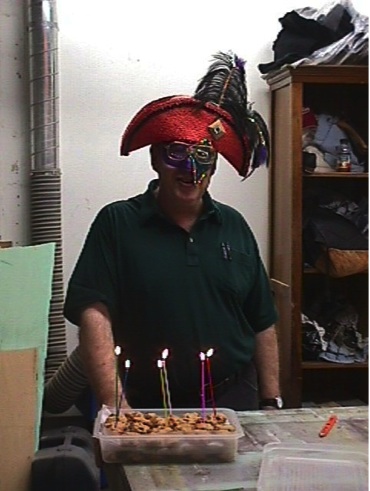Anyway, not too long ago we went to the opening of a new exhibit (one which was put together locally) of examples of recent art selected from artists in the Omaha/Lincoln area. Before the official gallery opening, there was a discussion by members of the jury about how they went about selecting the pieces to be included in this exhibit. I’m not sorry to have attended the opening, or this discussion, but I was reminded of my rather low tolerance for most critics and much criticism. NOTE: I am making a clear distinction between a “critic” and a “reviewer.” This distinction is, I believe, significant and important.
A “reviewer,” as I am using the term, is simply expressing her/his opinion about a work, be it a work of theatre, poetry, movie, story, visual art, etc. This often does (I think generally should) include some mention of what it is about the work under discussion which the reviewer finds interesting, exciting, moving, etc. On the other hand, it is clearly an expression of OPINION. It often might include some comparison to another work (especially in the case of a theatrical or musical performance, for example) such as, “I like the version of the song ‘The City of New Orleans’ that I heard Steve Goodman (the author/composer) perform live on ‘The Midnight Special’ radio program on WFMT in Chicago better than the one which Arlo Guthrie made famous, because I think Goodman’s version really captured the rhythm of a train and ‘works’ with the song better.” Or, “I like the Kenneth Branagh movie of Hamlet because it’s the complete, uncut, play, but I enjoy the David Tennant/ RSC version more because I think it captures the sense of Hamlet’s ‘sane madness’ the best of any version I’ve seen.”
“Criticism” often does much the same sort of thing, although it often tends to be more “academic” and/or retrospective. That is, many people (myself included) think of a “review” as an immediate reaction, while “criticism” implies a period of reflection and study, often involving some degree of research. “Critics,” all too often, however, seem to have a proclivity for not expressing their opinions as opinions, but declaiming them as JUDGEMENTS. “So and so is an important artist because she/he deals with the counter-cultural aspects of existence through the influence of non-traditional materials.” OR, “This is a profound play (book, movie) dealing with psycho/social aspects of personality which the modern world struggles to understand.” OR, “I hate to see Shakespeare’s plays performed because I get so much more out of them when I read them.” to quote one of my not altogether appreciated English professors from my undergraduate days.
I confess that I really dislike (“hate” may be too strong, as it implies that I care enough to invest that much emotion) this sort of “critic” and this sort of “criticism.” It particularly bothers me because a lot of artists (seemingly especially visual artists) feel that they need to use the language of “criticism” to explain their art, so you find this sort of stuff all too often being posted near various works in museums, although I’ve seen an awful lot of it in theatre’s penchant for having a “concept” in production and, especially in design. My primary objection to this sort of thing is that it seems that far too much of the time it seems to simply be a form of intellectual (or pseudo-intellectual) masturbation designed to impress other critics (and, perhaps, other artists). I don’t find that much (if any) of it really helps me appreciate a work more. I’ve never been afraid to assert that I have a right to my own opinion and a willingness to express it. Nor, do I think others shouldn’t feel the same way. A piece (of any sort) either “works” for you, or it doesn’t, and a lot of gobbledey-gook doesn’t make much difference.
As a scholar, I find it perfectly easy to acknowledge that Tennessee Williams wrote a number of highly important plays. Probably A Streetcar Named Desire is at the top of most people’s list of his “greatest” plays. I’ve never really cared for it. I love The Glass Menagerie, but I’ve never really cared for Streetcar, or most of his other plays. I’ll admit they tend to be well crafted, the characters have a sense of “roundness” and completeness which I admire, but they tend to be what I would call “unpleasant” people caught in “unpleasant” situations and I don’t particularly enjoy spending my time with them. Glass Menagerie isn’t exactly about the happiest people or situations, but I find that I have a kind of sympathy for those characters and, perhaps, a greater understanding of their situation, so I find the occasional chance to re-experience that play is much more attractive to me than most of Williams’ other ones. TO ME! NOTE: I’m not suggesting that anyone has to agree with me, just that this is how I react to these works.
I believe that it was Goethe who suggested that criticism (I’m using the term pretty loosely here because it gets used loosely) should be based on three ideas: 1.) What was (were) the artist(s) trying to do?; 2.) How well did he/they do it?; and, 3.) Was it worth doing? Goethe was, I believe, specifically discussing theatre criticism, but I think the ideas apply pretty well to all art. I think that good art should be pretty much self-explanatory. That is, it shouldn’t require the intervention of an “expert” to tell us (the viewer/purchaser/reader/consumer) what any particular work of art is “about” or what the artist was attempting. Nor should they have the right to belittle those of us who think that a big part of an artist’s job is to make his/her point clear to us, rather than forcing US have to try to understand THEM.
Ideas are subtle and most art seems to be at least somewhat subject to interpretation, so people can (should?) disagree to an extent about what is being attempted, and/or the level which has been achieved. It is also true that a degree of experience with any art form can assist one in making more discerning judgments and seeing subtler details, but it shouldn’t require a fancy degree (or a doctoral dissertation) to figure out (more or less) what an artist has attempted to communicate. Yes, I am old fashioned enough to believe that art has something to do with communication. But, I don’t think that is quite the same as saying that it has to have a specific “message” which is fixed for all audiences at all times. Sometimes just trying to express a mood or a feeling can be not only valid, but worthwhile.
There’s a work at the Joslyn of which I’m very fond which is a repeating, digital video showing the life cycle of a tree through the year. One can watch the buds form into blooms, the flowers fall, leaves appear, mature into full form, blow around in the wind, and eventually change color and fall to the ground revealing the tree’s bare branches and then, the process starts all over again. This is done in full color and takes a bit of time (about a minute and a half, I think) to complete. I have no absolute idea of what the artist was trying to “say” with this piece, but I can say that (to me) it communicates a mood relating to the repetition of the natural life cycle, a hope for the future, a desire to enjoy the life I have rather than worry too much about what is coming or what’s been. It’s hard to put my response into specific words (it often is with art, I think), but it makes me happy and thoughtful at the same time, AND THAT’S ENOUGH FOR ME! I think that’s at least a part of what this artist wanted people to experience when they encountered her work. Might someone else “get” something else from the work? Sure! And that’s okay, too. But, that’s pretty much what I think the artist was trying to do. I am rigid enough to suggest that I think that a valid response to any work of art should in some way reflect the subject matter, medium chosen, etc…. That is, one should probably at least try to give the work a chance, but not everything is really going to work for every audience, and it does no good to blame the audience for not “getting it,” or to belittle their intelligence (or sensitivity) for not having the same response you do (which suggests that yours is the only “correct” response) which I find absurd!
Obviously, in the case of this video, I think the artist has done something pretty well. I’ve seen it on two, or three occasions and I look forward to seeing it again. It should also be obvious that I think it was worth doing because I think it’s had an influence on me, I want to see it again and I remember the feeling I have when watching it with thoughtful pleasure. I have no idea how others would react to this piece. But I really don’t care. I like it! It makes me happy, makes me think, makes me feel. I think that’s what all art is supposed to be about.
All too often what we call “criticism” is about having someone tell us what we are “supposed” to think about something, how we are “supposed” to feel about it. The obvious conclusion is that, if we don’t feel this way, the fault is with us. I think that’s a load of “bull*/&#.” There’s no reason why we all have to think and feel the same way about anything and the biggest mistake we can make is to accept being made to feel somehow inadequate because we don’t always agree with what the “experts” tell us about how we are “supposed” to react. They MAY have more academic knowledge and experience than we do, but we still have our own emotional reactions (which might change as we acquire more experiences, etc).
The notion of this sort of “criticism” has (in the fairly recent past) spilled over into the theatre with the notion of “concept.” We now have to have a “concept” for every production and every designed aspect of it. To me, this has often lead to a lot of baloney in attempting to explain the reason why we are doing something which may, or may not actually be based on the ideas of the script, but which has been chosen to show that we can be “creative” and create a unique “interpretation.” Now, I have nothing against creativity or uniqueness, but I believe that interpretations and productions should always serve the script, not be added on top of it to prove that the production team can be clever.
If it comes right down to it, every design I’ve ever done, play I’ve directed, etc. had one (and only one) ultimate “concept.” That was to create a valid (meaning true to the author’s intent as I understood it) interpretation of this play, for this audience, with this production team, cast and crew, in this facility, at this time. Just that can be enough of a challenge. Sure, my colleagues and I often could come up with “critical” explanations, especially when we changed period, or the like, but they were, in fact, often made up after the fact. Sometimes, we just wished to try out an idea which we thought might be interesting to us and the audience given the circumstances of that particular production.
Steve Ayers, Susan Brown-Strauss and I did a "post-apocalyptic, Shakespeare meets Mad Max," production of Romeo and Juliet at one point because “… it would translate the play into terms which would be more transparent and comprehensible for modern audiences.” or some such. The fact is that we just were all rather bored with the idea of doing yet another pink and blue, Renaissance period production and this idea gave us a chance to try something different and see if we could make it work (although we DID feel that the basic story is timeless enough that it should still make sense).
I still remember that production and I think it was at least reasonably effective for our Cullowhee audience. It’s worth noting that we didn’t change Shakespeare’s script (although we did, as I remember it, cut the Prologue). We mostly just made visual accommodations to a different period: the set was composed of “bombed out” buildings and rubble; the apothecary became a drug dealer; the priest was a sort of witch-doctor shaman; the families became (essentially) rival gangs feuding over territory in a bombed out city “ruled” by a “boss” who was portrayed as powerful enough to be feared by both “families.” Costumes were made to look like they had been scavenged from what might have survived an apocalyptic event (the Duke’s “armor” made from CD’s had an almost chain mail quality and just blazed in the light). All things considered, it was a fun show to do at that point in our lives and just MIGHT have made some people think again before rejecting Shakespeare as being just another “old, dead, white guy” with nothing to say to modern people. I hope that was the case anyway.
I guess what all of this boils down to is the idea that I think what artists are supposed to do is have, or find, the means to express ideas in some sort of form. Those forms can include literature, music, dance, theatre, motion pictures, a variety of other visual media (still and motion), etc. Note that generally in the Theatre the basic ideas are first defined by the playwright and we, the theatre artists, create some of the means of expressing them to the audience!
Still, in the long run, I believe that what’s truly good lasts and influences others. Why? Not because some “expert” says it is great, or important, but because it communicates something which, over time, a reasonable number of people respond to. It changes them. It makes them better. It lets them feel!
Does everyone have to like everything? NO! One can acknowledge the influence, or importance, or significance of something without finding it of personal value. The all too often made mistake is thinking that because something can be considered to be of value, everyone has to “like” it or respond equally strongly to it. To me, that’s the absolute dullest form of conformity, but it seems to be what some “critics” would advocate.
I’m not afraid to suggest that “I don’t know a lot about Art, but I know what I like.” Call me a fool, if you’d like to, but I have no problem accepting that what moves you emotionally may not be what moves me – and that’s okay!
LLAP





 RSS Feed
RSS Feed